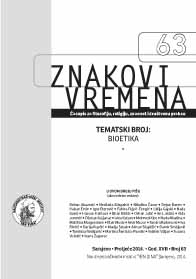Mesijanizam nacionalnih ideologija u stereotipima i predrasudama u predstavljanju bošnjačke nacije
Messianism of national ideologies in stereotypes and prejudices in portrayals of the Bosniak nation
Author(s): Dženan KaljanacSubject(s): Social Sciences
Published by: Naučnoistraživački institut »Ibn Sina«
Summary/Abstract: Stereotypes and prejudices in portrayals of the Bosniak nation are also infused with messianism. The messianism of national ideologies is a phenomenon whose practical application in ex-Yugoslavia is most precisely presented in a stereotypical portrayal of the Bosniak nation. For more than two hundred years a perfidious, sometimes completely open, stereotypical portrayal of Bosniaks’ social-historical being has been going on. The very notion of messianism is of religious nature, because the root of the word is a Messiah, meaning a savior, a gatherer, who will eventually establish a kingdom of justice and peace. Apart from a classical, religious messianism, this region also offers a political as well as a “cultural” messianism. The national messianism simply transfers into what is usually referred into as nationalism. The idea/notion on being chosen has easily spawn a consciousness of specially privileged, what was a case in this region, and which should awake a “subtle” feeling responsibility. Historical fundamentals of the Serbian and Croatian messianism can, in part, be explained by the Serbian and Croatian resistance to Islam and the Ottoman Empire. The very geographical position of Serbia and Croatia allowed messianic ideologists to claim that the Serbs and Croats were defenders of Europe from Islam, a role that was interpreted messianically. The results of such Serbian and Croatian messianism was felt on their skin by the Bosniaks. The Bosniaks, with their country of Bosnia and Herzegovina became objects of the aggressive Serbian and Croatian national messianism. About the Bosniaks, there is also a deeply rooted stereotype of ignorance and often contempt for the Islamic culture that is interpreted as barbaric, irrespective to the fact that it contains high humanistic standards, historically justified, perhaps most explicitly, in Bosnia and Herzegovina. Also, the forming of this stereotype was additionally contributed by current ideological stereotypes on Muslim fundamentalism and terrorism, as if there is no other fundamentalism and terrorism in the framework of other spiritual-fundamental and political agendas.
Journal: Znakovi vremena - Časopis za filozofiju, religiju, znanost i društvenu praksu
- Issue Year: 2014
- Issue No: 63
- Page Range: 305-316
- Page Count: 12
- Language: Bosnian

